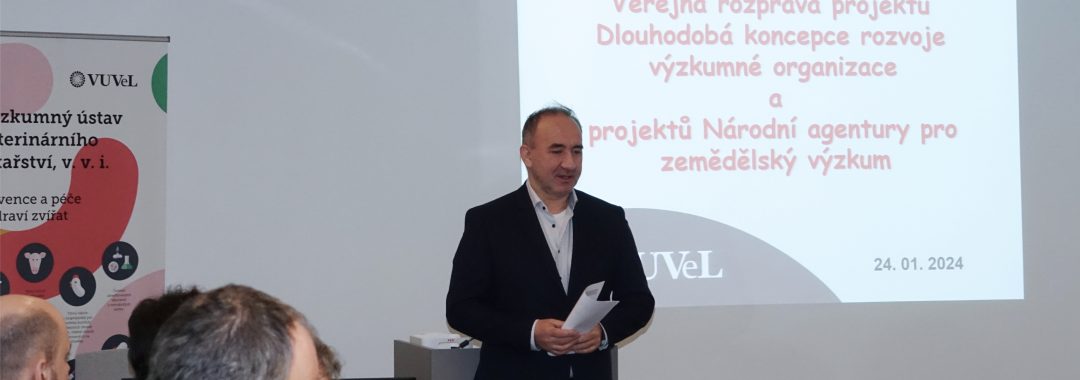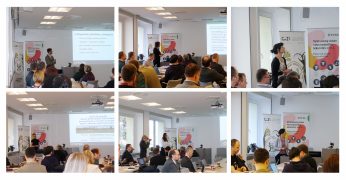On 24 January 2024, discourses on the periodic and final reports for the year 2023 took place in the large meeting room of the Veterinary Research Institute.
The meeting was opened by the Director of the Institute, Dr. Faldyna. He introduced the guests from the Ministry of Agriculture and the members of the Assessment Board, consisting of members of the VRI Board and representatives of the State Veterinary Administration, the Institute for State Control of Veterinary Biologicals and Medicines, Mendel University in Brno and the University of Veterinary Sciences Brno. On this festive meeting, he also recalled the 100th anniversary of the Czech Academy of Agricultural Sciences and its significant role in shaping applied research within the agricultural sector. Furthermore, he emphasized the role of the successfully completed strategic projects implemented under the Operational Programmes, thanks to which the Institute is a stable research organization within the Ministry of Agriculture and, in accordance with its Founding Charter, is dedicated to basic and applied research and development in the fields of veterinary medicine, veterinary hygiene and ecology, and related biomedical, agricultural and food sciences.
Dr. Faldyna continued by presenting basic data on the implementation of the long-term conceptual development project for the research organization in 2023. The project was undertaken under 7 research objectives (1) Infectious Diseases; (2) Immunology and Preventive Medicine; (3) Diagnostics, Antimicrobials and Probiotics; (4) Genetics and Reproduction of Farm Animals; (5) Experimental and Pharmacological Toxicology; (6) Advanced Dosage Forms and Pharmacology; and (7) National Sustainability Plan. As a result of the project, research activities were carried out that have led to the achievement of the planned results for 2023, in some cases beyond the plan. However, more importantly, the project has led to progress in all key areas of the Institute's operation, encompassing scientific, applied, project, and developmental domains. This progress, along with its further impact on transfer to end-users, was appreciated in the reviewer's comments prepared by Prof. MVDr. František Treml, CSc. from the University of Veterinary Sciences Brno. He also acknowledged the activities related to knowledge transfer to the agricultural industry and veterinary practice, thanks to the VRI ACADEMY series. In conclusion, Dr. Faldyna expressed gratitude to all those who contributed to the successful implementation of not only the DKRVO project but also all completed, ongoing, and future projects at the Institute receiving special support.
The next part of the programme focused on the public discourse of periodic and final projects under the National Agency for Agricultural Research, implemented in 2023, with the Institute as the subsidy recipient. The presented results of the projects covered the topics of infectious animal diseases and antibiotic consumption in livestock production, as well as chemical and microbiological safety of animal-derived food. An example of the research results is a probiotic formulation designed for newly hatched chicks with the aim of increasing their resistance to bacterial pathogens as a means of reducing antibiotic consumption. This formulation is currently under evaluation at the Institute for State Control of Veterinary Biopreparations and Medicines.



